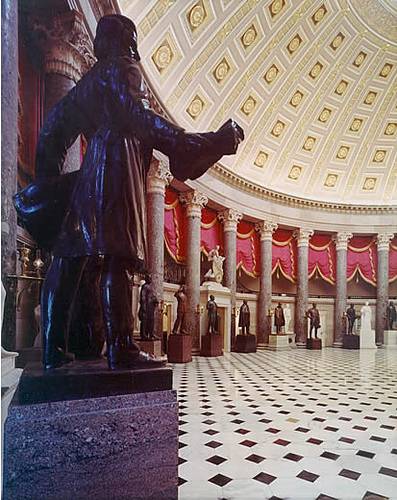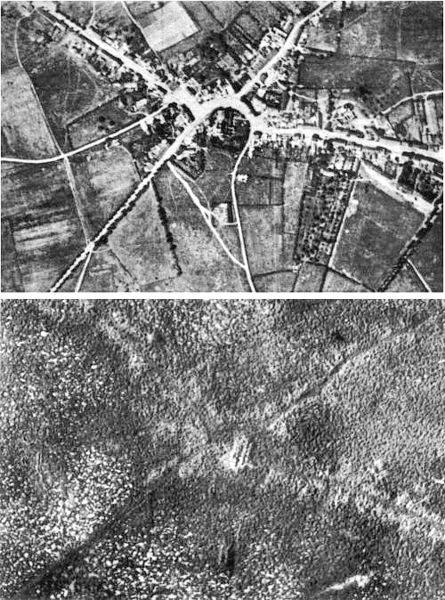
The National Statuary Hall in the United States Capitol is a “whispering gallery” — because of the room’s shape, whispers at one end of the room can be heard clearly at the other.

The National Statuary Hall in the United States Capitol is a “whispering gallery” — because of the room’s shape, whispers at one end of the room can be heard clearly at the other.
leiotrichy
n. straight-hairedness
On Oct. 24, 1593, a man suddenly appeared in the Plaza Mayor of Mexico City. He was wearing the uniform of the guards of Malacanang Palace in the Philippines, and he claimed he had no idea how he had arrived in Mexico.
The man said that his name was Gil Perez and that was a Spanish soldier of the Filipino Guardia Civil. Moments earlier, he said, he had been on sentry duty at the governor’s palace in Manila. He said the governor, Don Gómez Pérez Dasmariñas, had been assassinated.
Perez refused to believe he was in Mexico City, as he had received his orders in Manila on the morning of Oct. 25, which now lay in the future. The Inquisition questioned Perez, but he could only repeat that he had traveled from Manila to Mexico “in less time than it takes a cock to crow.”
Two months later, news arrived by a Filipino ship that Manila’s governor had indeed been assassinated on Oct. 23, and witnesses confirmed that Gil Perez had indeed been on duty in Manila. One of the ship’s passengers said he recognized Perez and swore that he had seen him in the Philippines on the day of the assassination. Perez eventually returned to the Philippines and took up his former position as a palace guard.
Historians point out that this story didn’t appear in writing until a century after it supposedly happened, and no records of Perez’s imprisonment or interrogation have been found, so there’s no way to know what the truth is.
The first Harry Potter book was given a print run of only 1,000 copies.
Today, these copies are valued at between £16,000 and £25,000 each.
On June 23, 1626, a fishmonger in Cambridge, England, gutted a large cod and found a book inside. Wrapped in sailcloth, it turned out to be a discourse on the sacraments written by Protestant priest John Frith. Before being burned at the stake in 1533, Frith had been detained in an Oxford fish cellar.
A Mr. Mead, fellow of Christ’s College, Cambridge, wrote, “I saw all with mine own eyes, the fish, the maw, the piece of sailcloth, the book … only I saw not the opening of the fish, which not many did, being upon the fish-woman’s stall in the market, who first cut off his head, to which the maw was hanging, and seeming much stuffed with somewhat, it was searched, and all found as aforesaid.”
If that sounds, well, fishy, Mead says, “He that had his nose as near as I yester morning, would have been persuaded there was no imposture here.”
Impressed, Cambridge reprinted the volume as Vox Piscis — “The Voice of the Fish.”
On Aug. 4, 1577, a great storm broke over the English town of Bungay. According to an account by Abraham Fleming, a huge black dog appeared in the local church, “running all along down the body of the church … passed between two persons, as they were kneeling uppon their knees, and … wrung the necks of them bothe at one instant.” The dog fell upon another man and “gave him such a gripe on the back, that … he was … shrunk up, as it were a peece of lether scorched in a hot fire.”
According to the legend, the black dog terrorized another church on the same day, leaving spectral claw marks in the door.
It makes a good story, but it turns out that Fleming was a propagandist for the Puritant church, which taught that storms were divine punishment. Parish records reflect the storm, but there’s no mention of the dog. Still, there are those claw marks …

The Belgian village of Passchendaele before and after the Third Battle of Ypres, 1917. Aerial photography showed 1 million shell holes in one square mile.
After the battle, the following notice was found in a dugout full of dead British soldiers. It was signed by their Australian commander:
Clemenceau said, “War is a series of catastrophes that results in a victory.”
The Stone Age isn’t quite over — not everywhere. On North Sentinel Island in the Bay of Bengal lives a tribe of about 250 people, the Sentinelese, who have remained so hostile to contact with outsiders that their society is almost entirely free of modern influences.
They have no agriculture, subsisting through hunting, fishing and gathering plants. It’s not even clear whether they can produce fire without an external source like lightning.
The Indian government has made overtures by leaving gifts, but the warlike Sentinelese drove them off. Earlier this year, Sentinelese archers killed two fishermen who came too close to the island. Their bodies still haven’t been recovered — even a helicopter sent to retrieve them was driven off by arrows.

Older than the pyramids, Ireland’s Newgrange lay lost for millennia until workers uncovered it while looking for building stone in the late 1600s.
No one knows who built it or why, but each year at the winter solstice the sun shines directly along a special passage into a chamber at its heart.
Oscar Wilde wrote, “The true mystery of the world is the visible, not the invisible.”
Three men stop at a hotel and agree to share a room for $30. Each gives the desk clerk $10.
Later, the clerk realizes he’s overcharged them for the room by $5. He gives the bellboy five $1 bills and tells him to return the money to the three men. The unscrupulous bellboy keeps $2 for himself and gives $1 to each of the three men.
So the men paid $9 each for the room, for a total of $27. The bellboy has $2. What happened to the other dollar?